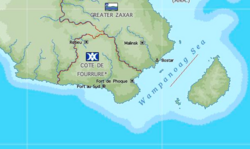Côte de Fourrure
République de Côte de Fourrure Côte de Fourrure | |
|---|---|
|
Flag | |
Motto: "Gaurdian of the Sea" | |
 Map of Côte de Fourrure | |
| Capital | Port au Sud |
| Largest city | Fort de Phoque |
| Official languages | Lysian |
| Ethnic groups | Lysian (65%), Fearanneth (19%), Powhaten (8%) Therno (7%), Other (1%) |
| Demonym(s) | Fourruren |
| Government | Military Stratocracy |
• General | Field Marshal Caitlin Friseal |
| Establishment | |
• Côte de Fourrure | ~1700 CE |
• Fearannth Côte de Fourrure | 1756 CE |
• Côte de Fourrure | November 5th, 1902 CE |
| Area | |
• | 000 km2 (0 sq mi) |
| Population | |
• Estimate | 6,000,000 |
• 2022 census | 6,000,000 |
• Density | 000/km2 (0.0/sq mi) |
| GDP (nominal) | estimate |
• Total | $27,912,000,000 |
• Per capita | $4,652 |
| Gini | 57.2 high |
| HDI | 0.7643 high |
| Currency | Fourruren Dollar ($) (FD) |
| Date format | dd/mm/yyyy |
| Driving side | right |
| Calling code | +899 |
| Internet TLD | .cf |
This article or section is in the process of an expansion or major restructuring. You are welcome to assist in its construction by editing it as well. If this article or section has not been edited in several days, please remove this template. If you are the editor who added this template and you are actively editing, please be sure to replace this template with {{in use}} during the active editing session. Click on the link for template parameters to use.
This article was last edited by Z2 (talk | contribs) 16 months ago. (Update timer) |
Côte de Fourrure, officially known as Le République de Côte de Côte de Fourrure, is a sovereign state in Aurelia on Eurth. It is bordered by Zaxar and Powhaten to the north, the Wampanoag Sea to the east, the Adlantic Ocean to the south, and Pequot and Patuxet to the west.
Côte de Fourrure, abbreviated as CDF, is a culturally Lysian and Fearann dictatorship in southern Aurelia. It is a fairly small nation at (2nd paragraph. Political system. Short history in 1 sentence. Link with present in 1 sentence. Head of state.)
(3rd paragraph. Economy in 2 sentences. International relations in 1 sentence.)
Etymology
(WIP. Where does your country's name come from? Most RL national names come from a small variety of choice. Some examples: land of a tribe (ex. France, Persia, Mongolia, Russia), characteristic geography (ex. Netherlands, India, Morocco), an old ruler or religious figure (ex. Philippines, San Marino, Europa, Saudi Arabia), the Latin description of a place (ex. Australia, Argentina, Liberia). How is the name pronounced? How is the name translated into other languages?)
History
- 1700: Côte de Fourrure is founded by Lysian fishers, whalers, fur traders, and merchants in the early 1700s. It becomes an important center of trade connecting the west and the east.
- 1756: Côte de Fourrure is seized by Fearannteth as a colony in 1756. (Unrelated: Several thousand Lysians flee north to assimilate with the natives and eventually found Zaxar.)
- 1902: Conflict in Fearannteth leads to the colonial government losing control. On 5 November 1902, the self-governing nation of Côte de Fourrure is founded.
- 1904: Shortly afterwards, an ethnically Fearann military coup takes over the government.
- 2022: The Fourruren government increasingly aligns itself with Anglia and the Occidental-Azanian Pact. They want to maintain their grip on power against the ethnic Lysian resistance.
Geography
(WIP. Landscape. Climate. Where exactly is your country compared to others on the global map? Describe the landscape, plants, and animals. Which mountains and rivers are important to include? Describe are the climate and seasons? How does geography determine where people live? Are there areas separated from one another? How about cities? This will greatly help you with the next part of history.)
Politics
(WIP. Government. Separation of powers. Who rules, how, and for how long? Political parties. What levels of government exist? How about the local level? Who makes the laws? Who deals out your justice? Which government services exist? What is the name of your police? How are the armed forces organised? Foreign affairs, alliances, membership of international organisations.)
Economy
(WIP. Employment. Exports and imports. International partners. Currency. Energy. Transportation. Science & technology. Unemployment numbers. Tourism. Media.)
Demographics
(WIP. Demographics. Ethnic groups. Social classes. Language. Education. Marriage. Religion. Healthcare. Diseases.)
Culture
(WIP. Cuisine. Literature. Visual arts. Art. Architecture. Entertainment. Music & Radio. Television. Cuisine. Local customs. Clothing. Morality. Sports. Stereotypes. Your national symbols such as the flag and national anthem. Public holidays and festivities.)


